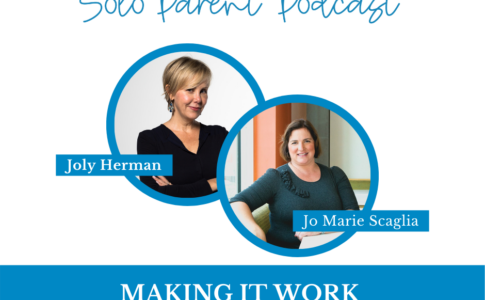Being a responsible adult is hard enough. Being responsible for the upbringing of kids and young people is sometimes so challenging we lose ourselves a little bit. We give so much in service of our kids that we forget the kid in us – the one who noticed the shape of the clouds, or who listened intently to the sound of crickets at night. We lose perspective as humans, as adults, and as parents who are parenting in divorced, widowed, blended and solo-by-choice families. It is so important to take an opportunity to breathe and reconnect with our creative spirit every once in a while.
Today, we are joined by writer and teacher, Janine De Tillio Cammarata. Janine is an award-winning author of seven books for kids and adults. She conducts writing and journaling workshops to help people “become aware of their fears, blocks, life purpose, anger, emotions, and ability to heal themselves.” I can’t think of a better person to help guide our solo parent community into a safe, creative practice that can help us to get in touch with our voices, our experiences, and our lives.
In this episode, we talk about…
[1:37] What journaling looks like in practice and why it is important for solo parents
Journaling has had a long place in history. You may think about it as keeping a diary, or a travel log. For Janine, journaling is a way to express emotions, prioritize time, or navigate a problem or situation. She calls it her “pause place”, where she can both record daily events and connect to her feelings. Writing out what is going on, how you are feeling, and what actions can be taken is often cathartic. Sometimes just writing it out may be all you need to do.
Looking back on past journals, you can see your growth. It’s like looking in a very gentle mirror – nonjudgmental, just a reflection of your own thoughts. If we don’t write things down, we can forget so much.
Solo parents can be under so much stress, and they can have so much apprehension about what is coming next or whether they are doing things right. It’s nice to have a place where you can have peace and reflect on life in a peaceful way. You can find a comfortable and soothing spot, and form a journaling practice that feels good for you.
[5:55] Starting a journaling routine
Anyone can journal – you don’t have to be a writer. Janine advises that you keep your journal in a safe place where nobody else can look at it. IF you want to journal for healing, self-awareness, and self-improvement, it isn’t going to work unless you are honest.
[7:43] Being honest when journaling
If you are trying to deal with a hard situation and determine how to best support yourself emotionally, journaling can be so helpful. You can do it on your computer if you want, but there is actually scientific evidence showing that putting pen to paper slows your brain down and helps you to separate from your emotions. This separation allows you to calm down and to think more clearly about the situation.
Janine recommends not making journaling into a chore. Don’t tell yourself you have to do it for a certain amount of time every day or it has to be done in a certain way. There are so many different ways to journal, including bullet journaling, creating artwork, and writing in sentence/paragraph form. Keeping it simple will help you to stay consistent and to work through what is actually bothering you at the time.
[9:25] Organizing and indexing a journal
You can also organize or index your journals in different ways. I’m kind of a regimented person, for example, and I have different journals for different things – one for emotional growth, and one for creative stuff. I have written things in my journal before and then had difficulty going back to find it later.
One option is to write an index for your journal. If you head to bulletjournal.com you can check out their organization strategies as well. Janine creates an index or a table of contents at the beginning of each journal. This system allows her to go back into her journals and find what she is looking for. You would do something like this as you go. Janine numbers her pages and creates her index while sitting and watching TV.
You could also use color coding systems, or create tabs for your pages. Again, starting simple is key. Finding a system that works for you is crucial. If your journal brings you joy, you are so much more likely to pick it up and write in it.
[16:35] Reflecting on your voice vs. writing to others
I think it is important to look back and remind yourself of your rich life. You can recognize your authenticity and experience pride looking back on what you have created and accomplished. It freezes a moment in time, and you can read your actual thoughts and learn about your voice.
For those of us who don’t have another person to talk to – like if you are a solo parent and you don’t have another parent to talk to – it helps to hear your own voice and decide how to deal with a situation. Additionally, it can be really hard when your kids are with the other parent and you are physically alone in the house. You might have more time to journal, however, and you can assure yourself and connect with your inner self.
Janine suggests starting a journal where you write to your child when he or she is not there, and/or having him or her write to you when they are away. That could be a nice way for parents to connect with their children when they are not together.
[20:11] Beginning a journal entry
If staring at a blank page is overwhelming, Janine recommends starting by putting a sticker on the page to lighten the mood and remove the pressure of the blank page. She then starts by putting the date and the day of the week, and sometimes the time of day, at the top of the page.
To start with, it may be easier for you to write about your day as if you were a reporter – just the facts.
- What did you do today?
- Who did you see?
- Where did you go?
- Was there something significant that happened in your day?
Just writing, even if you are creating a bulleted list, is a great place to start. If it is something you want to look back at for a strong memory, you will want to include more sensory details. If you are using your journal to help you with emotional well-being, be sure to dig into your feelings about your day and what you did. How did your mod change? What impacted your mood? Writing everything out can lead you down different paths that you may not originally have anticipated.
Janine suggests that you may also want to keep in mind the acronym RAINA:
R – Recognize and name the feeling
A- Acknowledge who you are feeling (and accept whatever that feeling is)
I – Investigate the situation, the stressor, and/or the person causing the feeling
N – Nurture yourself; help yourself to feel safe and comforted
A – Take action to work through the situation
[24:57] Journaling as a coping strategy for grief
Grief is a huge emotion to process. It may never go away, and yet we have to keep going. We’re parents who might be totally alone in this journey, or we might have a new partner, or we have lost someone and we don’t get a “day off” from being a parent to cope with that loss.
It is so important to release the emotional aspects of grief, and to give ourselves grace. Journaling is a way to take on that big block in front of you. Janine will sometimes complain in her journal, or write about her unhappiness or pain. The physical act of writing it out, whether or not you can even read it after she has scribbled everything down, makes her feel better and helps her to realize what she needs in order to move forward.
With events that cause grief, such as loss or divorce, different times will bring up different emotions. Journaling can help you to recognize that you feel certain ways around certain dates. You can recognize what is cursing the grief, and consider what you can do about it, with more clarity. Your journal is a place to put your grief when you can’t carry it any longer.
Ultimately, journaling through these big feelings allows you to go back and look at the experience with a different perspective later on. Being able to see and reflect on your ability to keep going provides hope and allows you to set intentions. In the end, we are the only ones you can work through our personal grief.
Journaling can help solo parents get grounded, creative, and in touch with ourselves.
CONNECT WITH JANINE:
https://janinedetilliocammarata.com/
https://www.instagram.com/janinecammarata/
https://twitter.com/JanineCammarata
https://www.pinterest.com/janinecammarata/journaling/
FOR INDEXING IDEAS:
CONNECT WITH US:






